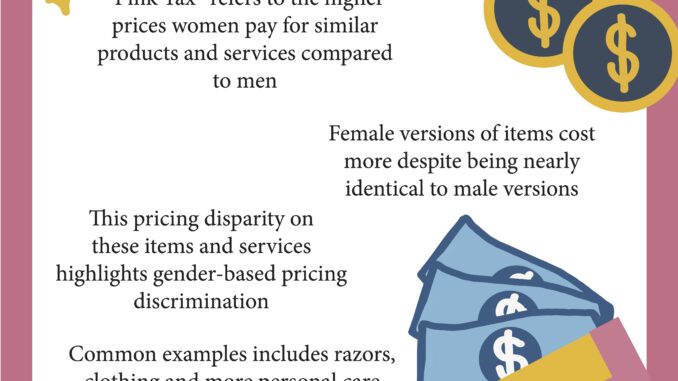
photo credit: Malak Chahboub
In an era where gender equality is becoming more of a focus, the persistence of the “pink tax” is a reminder of the inequalities that still exist in our society today. Pink tax refers to the practice where products and services marketed towards women are priced higher than similar items targeted toward men.
This unjust economic idea is not only a reminder of outdated gender norms but also a barrier to the true equality that our country strives for. It’s time to abolish the pink tax by recognizing it as an unfair practice that harms women financially and brings back ideas of gender-based discrimination.
Pink tax can be seen across a wide array of products- from personal care items like razors and shampoos to clothing and even car insurance. It has been shown that women often pay more for products that have the same function as those aimed at men.
For example, women’s razors may be priced significantly higher than men’s, despite being about the same in function and quality. We believe this pricing difference is not a coincidence. We think it shows a social tendency that some companies use to exploit gender differences for profit.
But this practice is not just about individual products, it also helps outline a systemic issue that affects women’s financial well-being. Women, on average, earn less than men and are more likely to experience economic hardship, according to Janine Rogan in her book, “The Pink Tax”. Pink tax proves this issue by forcing women to pay more for essential items than their male counterparts. It contributes to a cycle of difficult economic disadvantages, specifically for those women already struggling to make ends meet.
Beyond the financial side of pink tax, it can also have a psychological impact on women. It can do this by making women think they should pay more, simply for being a woman. This idea can lead women to feel frustration, anger, and even self-doubt.
When women are constantly faced with higher prices for the same products as men, it can send a message that their needs and preferences are less valued and should be less obtainable. This subtle yet powerful form of discrimination can make women’s confidence in their purchasing power and their worth in the marketplace plummet.
Pink tax can also draw attention to stereotypes about femininity. It often suggests that women require “special” products that often are more valuable, but less effective, than the same product being targeted at men. This not only limits women’s choices but also reintroduces the idea that women should fit into specific beauty standards.
Getting rid of pink tax is not just for fairness; it would also aid the economy. Addressing this issue could lead to increased purchasing power for women, allowing them to invest more in their health, education, and overall well-being. As women gain more economic freedom, they contribute more significantly to the economy, creating a ripple effect that benefits everyone, based on what Rogan said. If we want to get rid of pink tax, education is so important. By informing consumers about pink tax and what it is, we can encourage them to question pricing differences and empower women to make informed choices when it comes to product purchases.
Social media is one way to amplify this message, such as following groups like FEMINIST and A Girl Has No President, both found on Instagram.
The pink tax is a relic of an era that has no place in modern society. By pushing against this unjust practice, we can take steps toward gender equality and economic fairness. Let’s work together to ensure that pricing in the near future reflects value and not outdated stereotypes.


